Fennel looks like celery that went on vacation and gained a lot of weight! Jokes aside, it is one of the most popular veggies from Italy. Most of the Fennel found in American markets is sourced from California. But is Fennel keto approved?
Fennel is a keto-friendly vegetable because it contains only 3.7g of net carbs per cup (sliced). You can easily accommodate it in your daily carb limit on keto.
In this article, we’ll find out why fresh fennel is keto, whether fennel seeds are keto, and also explore some other low-carb veggies to enjoy on the ketogenic diet.
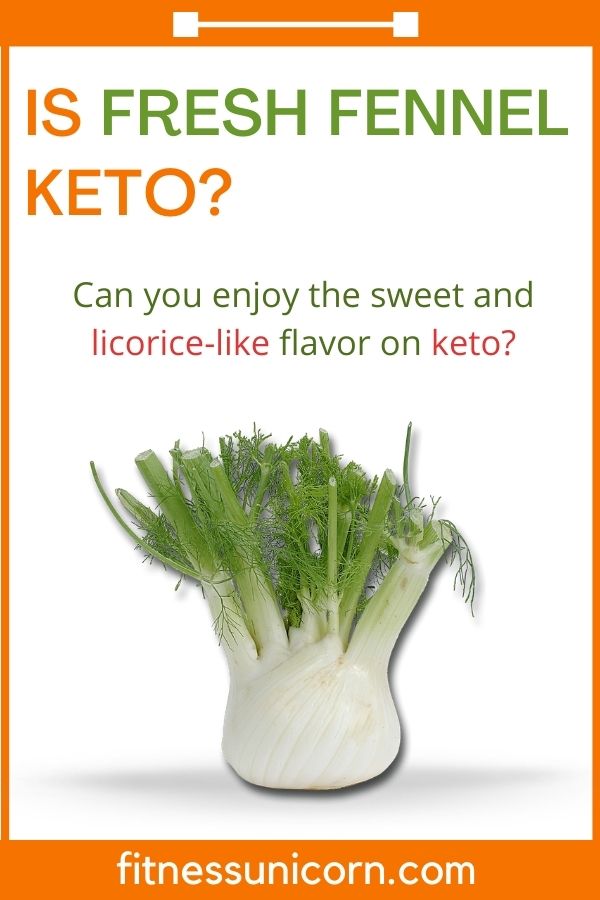
Is Fennel Keto Approved?
This bulbous veggie isn’t just low in carbs, but it’s also packed with a ton of health benefits! In fact, it has been used in many homemade remedies since ancient times!
According to USDA, a single large fennel bulb contains:
- 73 calories
- 0.47g fat
- 2.9g protein
- 17g of carbs
- 7.3g dietary fiber
The net carbs per bulb comes out to be a 9.7 grams, which is low enough to call it a keto-friendly vegetable.
Don’t know how to calculate net carbs? Here’s a simple example:
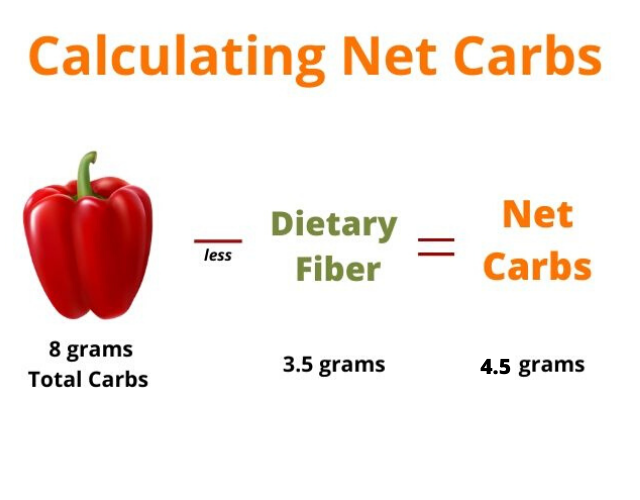
You simply take the total carbs in an item and subtract the amount of fiber and sugar alcohols present.
And voila! You have the number of net carbs right at your fingertips!
Coming back to our main topic, fennel can be a great addition to your keto salads and stir-fries.
All the parts of this plant (stalk, seeds, leaves, etc.) are edible and contain a lot of healthy micronutrients.
READ: Free Keto Diet Plan for Beginners
Is Fresh Fennel Keto-Friendly?
You’ll be surprised to know that fresh Fennel comes from the carrot family (what?)
While native to the Mediterranean, you can now find it all across the globe. Fennel is a flowering plant and you’ll often spot it in dry soils near the riverside or sea coasts.
If you are following the low carb diet (or keto diet), I have some great news for you!
Fresh Fennel is keto-friendly because a single cup (87g) serving of sliced fennel contains just 3.7g of net carbs. (Source)
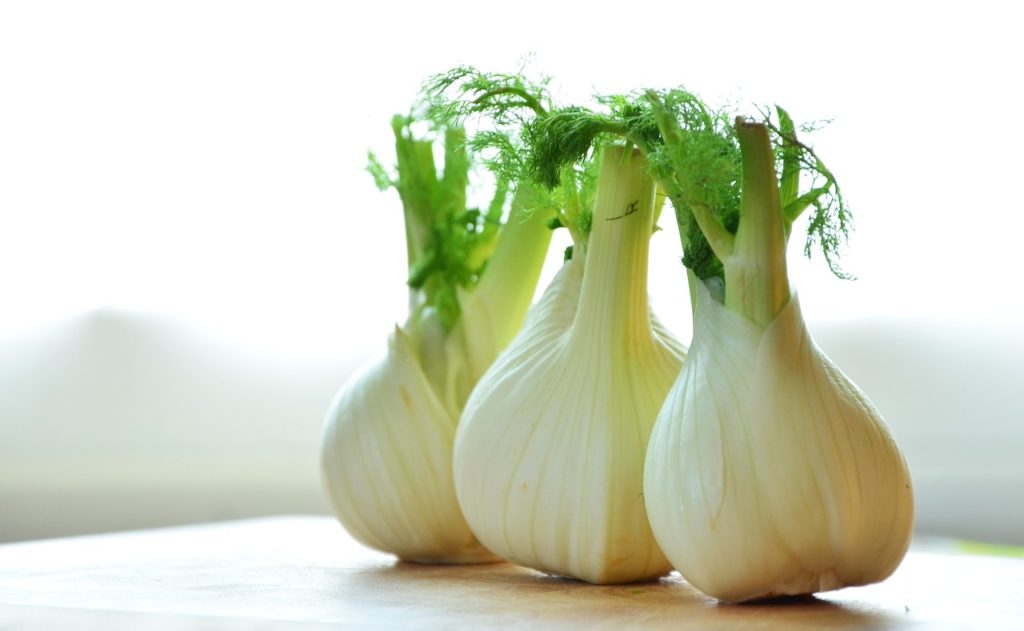
It is also known as “fresh anise” in some parts of the country. However, anise is a totally different plant that is famous for its seeds.
Having said that, you can always use them interchangeably as they both have a similar licorice-like flavor. For a stronger taste, I’d pick Anise over Fennel.
Fennel served with some olive oil and lemon makes for an excellent salad on keto. It tastes amazingly well when served as a side dish with Salmon!
Fresh fennel is one of those greens that you can really snack on! Roasted fennel ditches all its licorice flavor and turns into a super buttery, caramelized delight!
You can use fennel in a variety of low carb recipes like:
- Salads: Caramelized fennel adds a unique flavor to each keto salad.
- Side dish: Roasted fennel is an excellent side dish or appetizer that goes really well with fish/chicken recipes.
- Pasta: Add the leftover roasted fennel to your zoodles or keto-pasta to make it more satisfying!
- Soups: Make a scrumptious low-carb cream of fennel soup with some celery, fennel bulb, chicken broth, and cream.
Let me remind you, fennel brings much more to the table other than the licorice flavor and crunchy texture!
Just like most greens, it is also packed with a bunch of essential micronutrients. A single cup of sliced fennel (87g) contains:
- 360 mg Potassium
- 45 mg of Sodium
- 838 (IU) of Vitamin A
- 43 mg Calcium
- 10.4 mg Vitamin C
- 0.64 mg Iron
- 0.041 mg Vitamin B-6
- 15 mg Magnesium
There’s only one downside to eating fennel on keto – it has a very poor fat content!
A large fennel bulb contains just half a gram of fat, giving it a poor fat-to-carbs ratio.
Now that we have talked about fresh fennel on keto, where do fennel seeds fit in?
MORE: Is Jackfruit Keto?
Is Fennel Seed Keto-Friendly?
Fennel seeds have found a place in almost every culture across the globe!
They are often called “sweet cumin” as they clearly resemble cumin seeds in appearance.
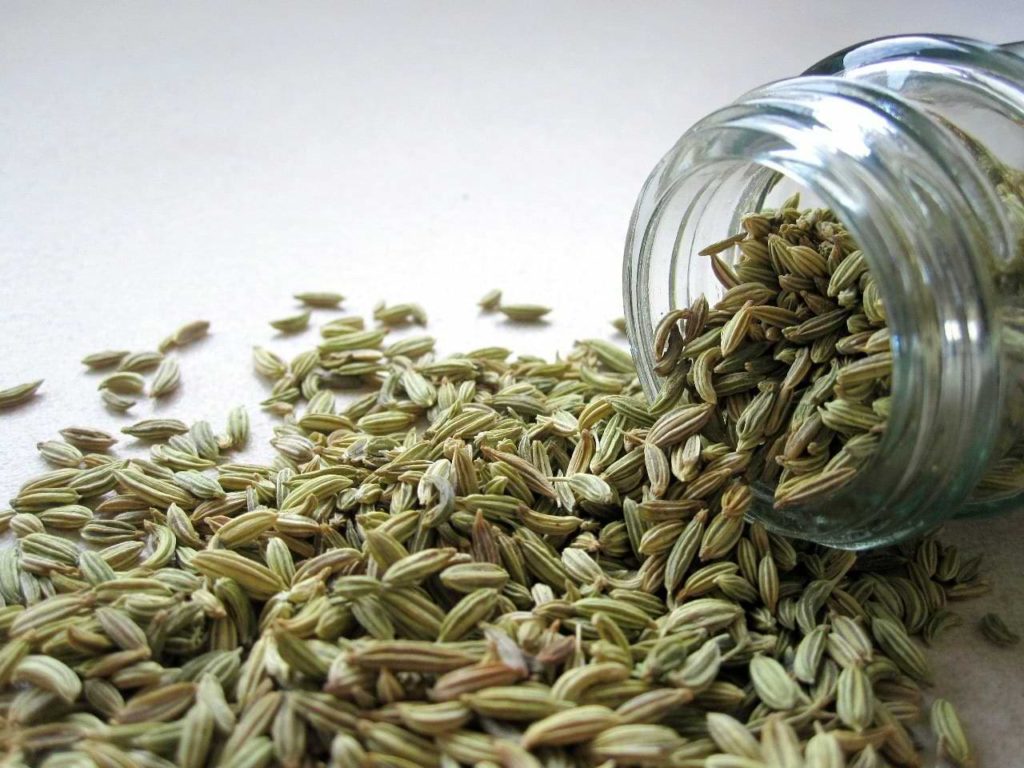
It is a common addition to sausages, curries, pot roast, bread, poultry, and sauerkraut. In fact, its seeds are also used as a mouth freshener in India.
Fennel seeds are keto-friendly because a 10g serving contains just 1.25g of net carbs. You can include it in various keto recipes as a flavor enhancer.
Just like fresh fennel, fennel seeds also have a sweet and licorice-like flavor. They add a unique and distinctive taste to your sauces, blends, and curries.
My only concern while eating fennel seeds on keto, is that they don’t have much fat!
A keto diet is a fat based diet where you should have more than 75% calories coming from fat.
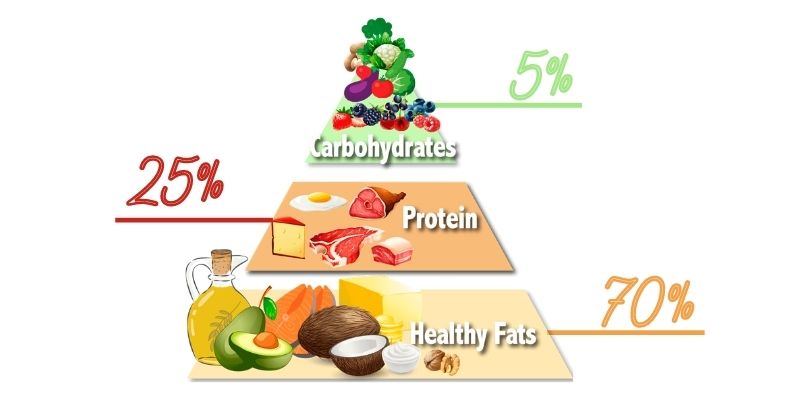
Roasted seeds can be an excellent keto-friendly snack. Here are some high-fat substitutes for fennel seeds:
- Sunflower seeds
- Pumpkin seeds
- Hemp seeds
- Sesame seeds
- Chia seeds
- Flaxseeds
RECOMMENDED: Is Tajin Keto?
Fennel Health Benefits
The fennel plant is packed with nutrition and all of it’s parts (leaves, bulb, seeds, etc.) provide many health benefits on the keto diet.
Supports Bone Health
Various minerals and vitamins in fennel contribute greatly towards your bone health.
Both the fennel seeds and fresh fennels are rich in manganese, which is essential for protecting cell damage and supporting bone growth. It also helps regulate blood sugar (a common goal for many keto-ers!)
Apart from manganese, Fennel is also abundant in potassium, magnesium, and calcium which further nurtures bone development.
Better Heart Health
Including fennel in your keto diet can be really good for your heart health!
A large fennel bulb contains 7.3g of dietary fiber – which is known to lower disease-causing factors like high cholesterol.
Review of more than 20 studies found that dietary fiber intake can lower your risk of various heart diseases.
Fennel seeds and fresh fennel are loaded with heart-healthy minerals like potassium, folate, Vitamin C, and Vitamin B-6. What’s more, its also free from cholesterol!
Potassium is a much-needed electrolyte when it comes to the keto diet. It is your best companion when going through the keto-flu as your body transitions into ketosis.
But wait, potassium has a bigger role to play in the human body!
In one study, participants consuming over 4000 mg of potassium per day significantly lowered their risk of death from ischemic heart disease.
Anti-Cancer Properties
Fennel plant is rich in various natural compounds that give a tough fight to cancer.
In fact, Fennel can provide you a rare cancer-fighting compound which is only found in animal proteins!
Yes, I’m talking about Selenium!
Selenium is a very powerful antioxidant that protects your body from cell damage.
It supports the liver in enzyme production and helps you fight disease-causing free radicals present in your body.
So if you’re on a vegetarian keto diet, make sure you add this celery-like veggie on top of your grocery list!
Cancer happens in the body on a cellular level. Folate found in the fennel is responsible for DNA synthesis and cell repair, which can lower the chance of developing cancer.
Other Health Benefits of Fennel on Keto
Eating fennel on keto will provide you with a ton of additional benefits:
- Selenium present in the fennel can greatly improve your immunity against infections.
- It contains Choline which can help lower chronic inflammation.
- The high amounts of dietary fiber can help prevent constipation and promote gut health.
- Estrogen, an essential hormone for females, is naturally present in fennel.
- A review of 10 studies found that fennel can improve menopausal symptoms in women.
Fennel is an excellent source of dietary nitrates, which may lower the risk for some forms of cancer and diseases.
Nitrates circulate between our gut, blood, & saliva. They are able to fight off bad bacteria present in your digestive system, such as Salmonella.
What Veggies are Bad for Keto?
Vegetables are often high in carbs and you can create horrific blunders if you eat the wrong ones on keto!
People on keto need to limit their carb intake to less than 20 grams per day. That’s why knowing your veggies is the first step to success on this low-carb journey!
As a rule of thumb, you should avoid all vegetables the grow below the ground (aka root vegetables).
These are some of the highest-carb veggies along with their carb count (per 100 grams):
- Sweet Potato: 17 grams
- Acorn Squash: 9 grams
- Yams: 23.5 grams
- Butternut Squash: 9.6 grams
- Corn: 18.6 grams
- Parsnips: 13 grams
- Peas: 9 grams
- Potatoes: 15 grams
- Beetroot: 7 grams
- Carrot: 7 grams
Note: Onion and garlic are also high-carb vegetables but you’ll find them in most keto recipes. The reason is pretty simple – you’ll only add a small amount of these veggies to enhance flavor.
MORE: Is Garlic Keto-Friendly?
Now let’s look at some low-carb veggies that you can use in keto recipes guilt-free!
What Veggies Can You Eat on Keto?
Vegetables are the soul of most weight-loss diets, and keto is not an exception!
There are plenty of low-carb veggies you can include in a keto diet.
An ideal keto-friendly vegetable has low carbs and high fiber content, giving it a minimal amount of net carbs.
Here’s a list of some of the less-known veggies that fit into the keto lifestyle:
Artichoke
Artichoke tastes as good as it looks!
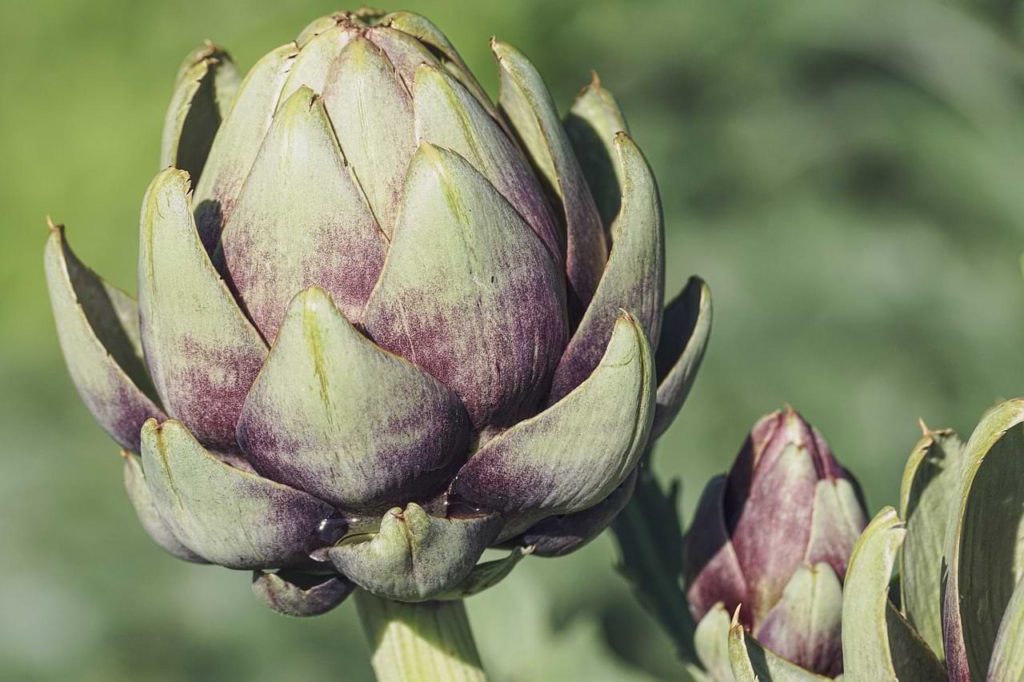
They are the buds of a plant from the thistle species. Preparing artichokes can be a little overwhelming sometimes but the efforts are well worth it!
Artichokes make a great side dish or appetizer on the keto diet. A half cup serving of Artichokes contains 5.2g net carbs.
Asparagus
Just like most greens, Asparagus is also an excellent addition to the keto diet.
Roasted asparagus with cheese and garlic can turn anyone into a keto fan! Even though it’s harvested in the spring season, you can find it in most stores throughout the year.
A single cup (134g) of asparagus contains just 2.2g net carbs.
Jicama
Jicama is one of the best low-carb substitutes to water chestnuts on keto. Crisps and fries made from Jicama give a tough competition to your favorite potato chips.
A single cup serving of Jicama contains 5g of net carbs.
You’ll be surprised to know that Jicama is actually a root vegetable!
I know, I said you should avoid all veggies that grow below the ground since they have a ton of carbs. But hey, exceptions are everywhere!
Broccoli
Broccoli is a very versatile keto veggie which goes well with salads, roasts, grilled meats, and stir-fry.
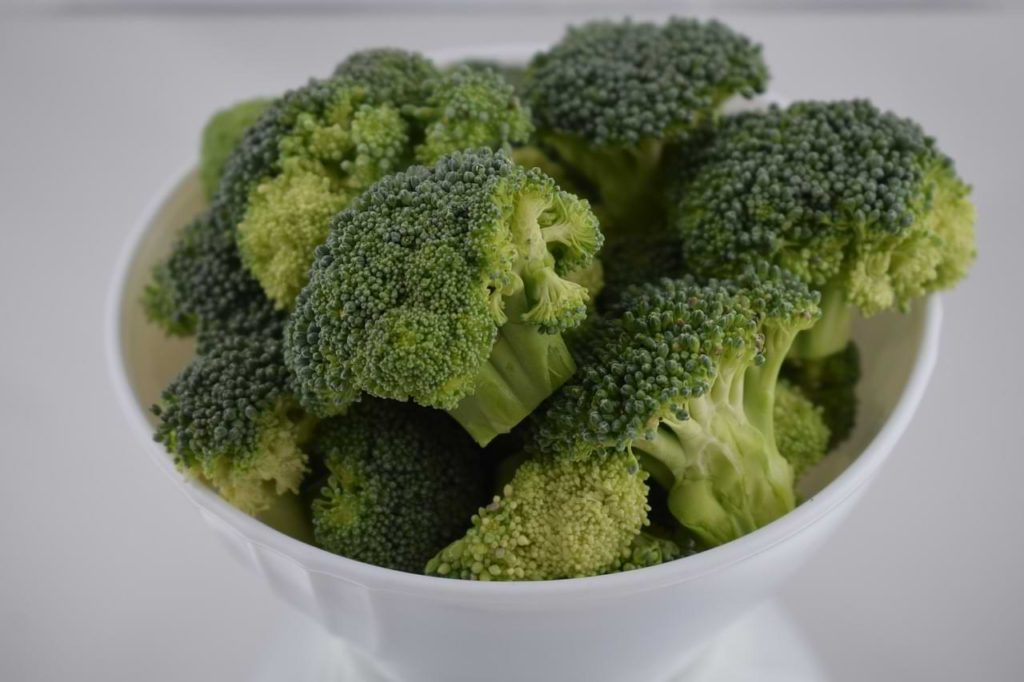
It is considered as a super-food due to its high fiber and protein content. That’s also the reason why it’s so famous among fitness enthusiasts.
A full cup (91g) of broccoli provides you 3.6g net carbs, which is great as per the keto standards!
Brussels Sprouts
Pan fried Brussels sprouts is one of the fastest ways to cook them.
A single cup of Brussels sprouts has 4.6g of net carbs, which is why they are a great addition to the keto diet.
If you don’t like them raw, you can char them to get a crunchy texture and smoky flavor.
READ: Is Edamame Keto-Friendly?
Common Low-Carb Veggies
These are some of the more common keto-friendly vegetables along with their net carbs (per cup):
- Bell Peppers: 3.6g
- Cabbage: 3g
- Cauliflower: 3.2g
- Cucumber: 3.2g
- Lettuce: 1g
- Eggplant: 2.3g
- Green Beans: 4.3g
- Kale: 3.4g
- Mushrooms: 2.2g
- Pumpkins: 6.9g
- Radishes: 2g
- Spaghetti Squash: 5.5g
- Spinach: 0.4g
- Zucchini: 2.4g
Conclusion
So is fennel keto friendly?
Fresh fennel is a keto-friendly vegetable that contains 3.7g of carbs per cup. Fennel seeds are also keto-friendly with 1.25g net carbs per 10g serving.
Since it is a low-fat vegetable, make sure you compensate for the fat throughout the day.
